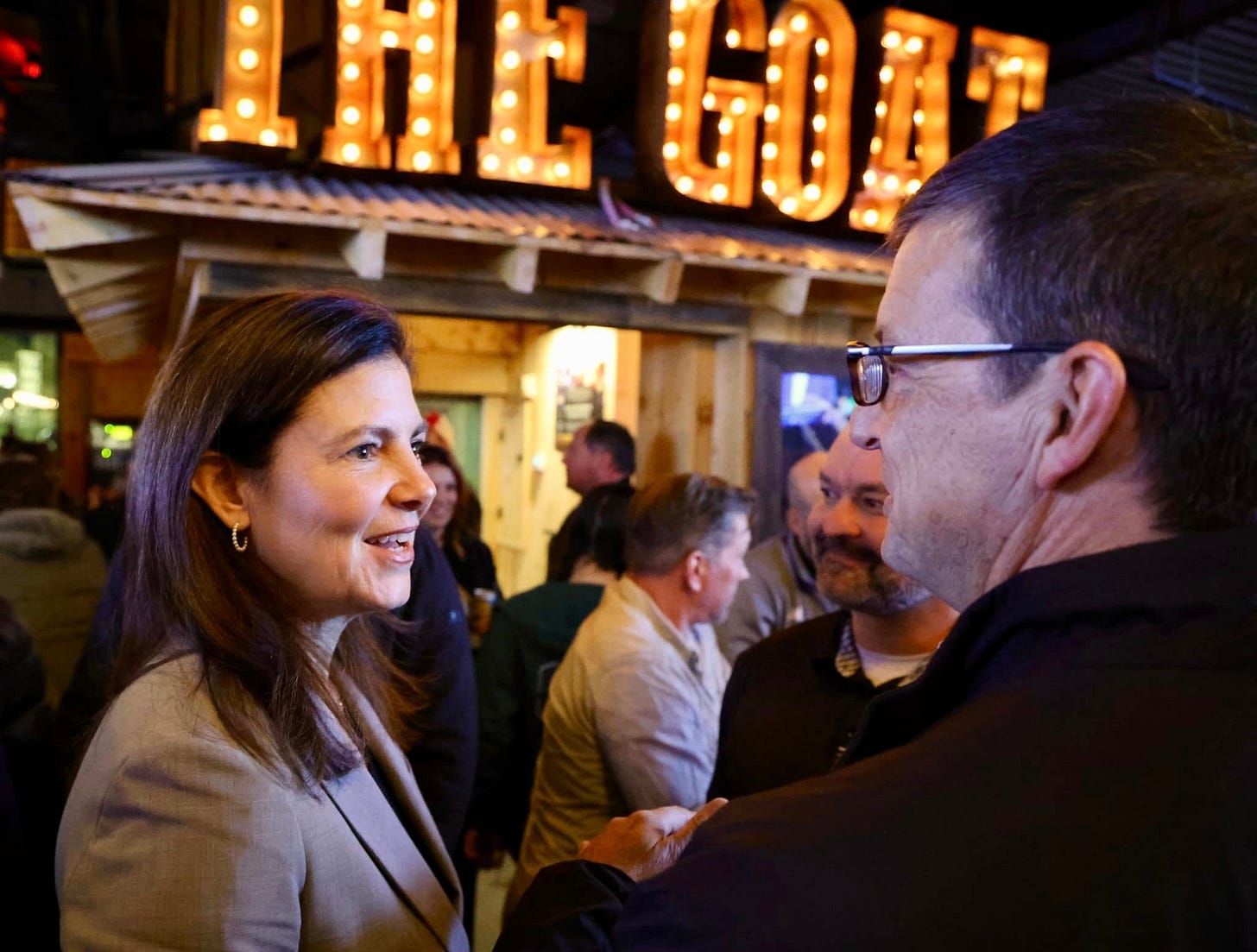Morning Digest, sponsored by Liftoff Campaigns: New Hampshire might finally abandon its last-in-the-nation primary
The debate now is just how early it should be

Leading Off
NH-Sen
As New Hampshire prepares for its first open Senate race since 2010, one major change might be on the way: The Granite State, which is famous (or infamous) for its first-in-the-nation presidential primary, could finally end its practice of being one of the last in the nation to conduct primaries for downballot office.
Ever since primaries were first introduced in 1910, state law has mandated that such elections take place on the second Tuesday in September. That's long made New Hampshire one of three small East Coast states—along with Delaware and Rhode Island—that perennially occupies the last slot on the primary calendar.
A message from our sponsor, Liftoff Campaigns:
New Report: Don’t Just Launch, Build A Movement
The best campaign launches don’t just make a splash—they lay the groundwork for everything that follows. Our latest report breaks down the key elements of a high-impact launch: integrating communications, digital, and fundraising; crafting a clear "why"; scaling smartly; creating defining moments; and establishing a brand that resonates.
Campaigns that master these fundamentals don’t just launch—they build movements.
But that late date poses a variety of problems, which has prompted lawmakers to consider moving it up. Among other things, officials have just eight weeks to prepare for the general election. In the event of a recount or legal challenge, that condensed timetable would be badly stressed, especially since federal law mandates that ballots be sent to overseas voters at least 45 days before an election.
The extremely short campaign season also poses a special hurdle for challengers, who have minimal time to raise money and connect with voters after securing nomination—an issue that prompted one Democratic legislator, state Rep. Kris Schultz, to call the current schedule "an incumbent protection plan" during a recent hearing before a state House committee.
It also offers little chance for a nominee to recover after a bitter primary—something Democrats discovered to their dismay in last year's governor's race. That contest saw former Manchester Mayor Joyce Craig emerge badly wounded following a negative campaign while Republican Kelly Ayotte, who faced only weak primary opposition, was largely unscathed. The better-funded Ayotte rolled to a 54-44 victory in November.
That painful experience seems to have helped dissipate Democratic hostility toward an earlier primary; the conservative NH Journal says Democrats had, until now, "generally opposed" such a change, warning it would create a "nonstop election season." On the Republican side, meanwhile, the National Journal explains that former Gov. Chris Sununu had long stymied the idea; Ayotte, however, is in favor.
The only question, it seems, is one of timing. One proposal under consideration in the legislature would shift the primary to the second Tuesday in June while another would bump it to the fourth Tuesday in August—just two to three weeks before the current date.
Ayotte has expressed a preference for June while Secretary of State David Scanlan, a fellow Republican, wants it in August. Lawmakers seem divided, with at least some worried that the earlier date would require them to campaign while the legislature, which usually wraps up business in June, is still in session.
Schultz rejected those worries, telling her colleagues, "I hope you don't wait until June to start talking to your constituents" and exhorting them to "think about the top of the ticket" rather than themselves.
And this time, either party could struggle at the top of the ticket if there's a late primary. Democrats could see a major throwdown between the state's two members of the House, Chris Pappas and Maggie Goodlander.
On the GOP side, meanwhile, former Massachusetts Sen. Scott Brown now says he expects to decide on a bid by early summer. Notably, he has not expressed any desire to defer to Sununu, who is also eyeing the race and told Fox News on Tuesday that intends to make up his mind in the "next few weeks."
Businesswoman Lily Tang Williams, who lost to Goodlander 53-47 last year, also told the NH Journal that she's "open minded" about either running for the Senate or waging another House bid and would decide by the end of next month. White House press secretary Karoline Leavitt, though, is a no; she lost to Pappas 54-46 in 2022.
We publish the Morning Digest 240 times a year, and each issue is chock-full of the information you need to make the smartest decisions about which races to invest in. If you value our coverage—whether you’re using it as an operative, an activist, or a journalist—we’d be immensely grateful if you’d support us as a paid subscriber.
Governors
MI-Gov, MI-Sen
Conservative commentator Tudor Dixon reiterated her interest in running for either Senate or governor next year in a statement issued Tuesday, though she twice complained about Democratic Gov. Gretchen Whitmer by name while saying nothing about Michigan's retiring Democratic senator, Gary Peters.
But Dixon, who lost to Whitmer in a 54-44 drubbing in 2022, has one good reason to set her sights on Congress: Rep. John James. According to a new survey of the Republican primary from the GOP pollster OnMessage, James is sitting on a 54-6 lead over his closest would-be rival, former state Attorney General Mike Cox. All the other candidates are presumably in low single digits, though the memo's cut-off graphics make it impossible to tell their exact shares.
It's not clear who sponsored this poll, but James has extensively used OnMessage to buy paid media over the years (though he seems to rely on the Tarrance Group for polling). OnMessage also conducted a similar survey for a consulting firm in January (which said it was "not affiliated with any candidate") that likewise found James far ahead of the pack.
Dixon was not tested in either poll, though if she were to run for governor, she'd be entering a race where James has gotten off to a head start. The two-term congressman has yet to announce a bid, but he's reportedly told people he's going to run. On the Senate side, by contrast, a recent survey showed Dixon with a 40-36 edge on former Rep. Mike Rogers, who's gearing up for another campaign after narrowly losing last year.
House
TX-18
Harris County Attorney Christian Menefee, who became the first Democrat to launch a bid for Texas' vacant 18th District over the weekend, rolled out a batch of endorsements on Tuesday that includes Rep. Lizzie Fletcher, who represents the neighboring 7th District. Also on Menefee's list are former Reps. Colin Allred and Beto O'Rourke, two of the more prominent Democrats in Texas politics following their bids for statewide office.
So far, the only other Democrat in the race is aerospace consultant Isaiah Martin, though others may join. State Rep. Jolanda Jones said in a statement on Tuesday that she was "giving serious consideration" to the race and would make an announcement "at the appropriate time." Republican Gov. Greg Abbott, however, has yet to schedule a special election, so it's not clear how much time Jones—or anyone else—has to decide.
Even without a date for the election, though, office-holders like Menefee are subject to Texas' strict resign-to-run law, which is automatically triggered when certain local officials announce a campaign for another post.
Technically, that means Menefee has already resigned as county attorney, though he remains in the role in an acting capacity until county commissioners can select a replacement. (Menefee's post, which functions as the county's top civil lawyer, is a separate office from that of district attorney, which handles prosecutions.)
That person will serve until 2026, when a special election will be held for the final two years of Menefee's term. Menefee won reelection to a second four-year term last year by a narrow 50.5-49.5 margin over Republican Jacqueline Lucci Smith. Menefee's immediate successor, however, is likely to be from his party, since Democrats hold a 4-1 majority on the Harris County Commissioners Court.
TX-28
Webb County Judge Tano Tijerina, who had reportedly been weighing a bid against Democratic Rep. Henry Cuellar in Texas' 28th District, confirmed in a statement on Monday that he's "seriously considering" the race. Tijerina, who left the Democratic Party to become a Republican in December, has served in his current post, which is the equivalent of county executive, since winning election in 2014.
We publish the Morning Digest 240 times a year, and each issue is chock-full of the information you need to make the smartest decisions about which races to invest in. If you value our coverage—whether you’re using it as an operative, an activist, or a journalist—we’d be immensely grateful if you’d support us as a paid subscriber.
Legislatures
MN State House
The Minnesota Supreme Court unanimously rejected a Republican effort to recall 29 Democratic members of the state House in a ruling issued on Monday, holding that the GOP had failed to demonstrate "serious malfeasance or nonfeasance" required to prompt a recall election under the state constitution.
Republicans argued that Democrats, by boycotting the start of the current legislative session to deny the GOP a quorum in January, had run afoul of the law. But the justices concluded that Republicans could not demonstrate that Democrats had engaged in wrongdoing "by not attending the initial organizing session and all subsequent sessions thereafter," as they'd alleged, because quorum was established in early February (emphasis in original).
Republicans had tried to take advantage of a temporary 67-66 advantage to assert full control over the House, an effort Democrats sought to head off by staging a walkout. The boycott ended after the Supreme Court ruled that a majority of 68 was necessary to conduct business in the chamber, prompting the parties to reach a power-sharing agreement. Earlier this month, Democrats won a special election to restore the House to a 67-67 tie.
Mayors & County Leaders
New Orleans, LA Mayor
New Orleans City Councilman Oliver Thomas announced Tuesday that he was joining the October all-party primary to succeed termed-out Mayor LaToya Cantrell, a fellow Democrat. The new candidate, as we wrote back in December, has had a long and eventful career even for a Louisiana politician.
Thomas' first turn on the City Council ended in 2007 when he pled guilty to bribery ahead of a two-year prison stint. He later played himself on the HBO show "Treme" in a dramatization of his real-life scandal and won back a spot on the City Council in 2021. Thomas highlighted his past in his announcement video, saying, "I've owned it. I've taken responsibility, and I've learned immeasurably from it."
Thomas, who also touted his "track record of revitalization," joins City Councilwoman Helena Moreno and former judge Arthur Hunter in the contest to lead this loyally blue city. Other contenders could jump in ahead of the July 11 filing deadline, though no other big names have signaled that they're interested in running.
All candidates will run together on a single ballot on Oct. 11, with the top two vote-getters advancing to a Nov. 15 runoff if no one wins a majority.
New York, NY Mayor
Former Gov. Andrew Cuomo raised $1.5 million during the first two weeks of his campaign to become New York City's next mayor, according to new campaign finance reports, but Assemblyman Zohran Mamdani brought in a sizable $850,000 over the last two months—more than the rest of the Democratic field combined.
The newest entrant into the race, City Council Speaker Adrienne Adams, had even less time than Cuomo to raise funds, taking in $130,000 in just five days. Politico's Jeff Coltin characterized the effort as a "fast start," but Adams will still miss the next disbursement of public matching funds since she has not yet hit the minimum threshold of $250,000. The soonest she'll be eligible is May 30, just a few weeks before the all-important Democratic primary on June 24.
By contrast, Mamdani, a member of the Democratic Socialists of America, is likely to receive another $4 million in matching funds next month. Last week, video of Mamdani yelling at Donald Trump's "border czar," Tom Homan, went viral, leading to $250,000 in donations over the following day, according to his campaign.
Mayor Eric Adams, meanwhile, raised just $19,000 during the most recent reporting period and is not eligible for matching funds following his indictment on corruption charges.











The balance in the Minnesota state senate is almost as delicate as it is in the state house. The senate has 34 Democrats (Democratic-Farm-Labor) and 33 Republicans. However, the mathematics are in flux, on account of the fact that one state senator, Republican Justin Eichorn, was jailed yesterday for allegedly soliciting sex with a minor. Republicans have called on him to resign. Eichorn was also behind a state senate bill to declare "Trump Derangement Syndrome" an official malady, but he seems to be suffering from worse afflictions.
"...though the memo's cut-off graphics make it impossible to tell their exact shares."
Lol at the editorial critique you slid in there.